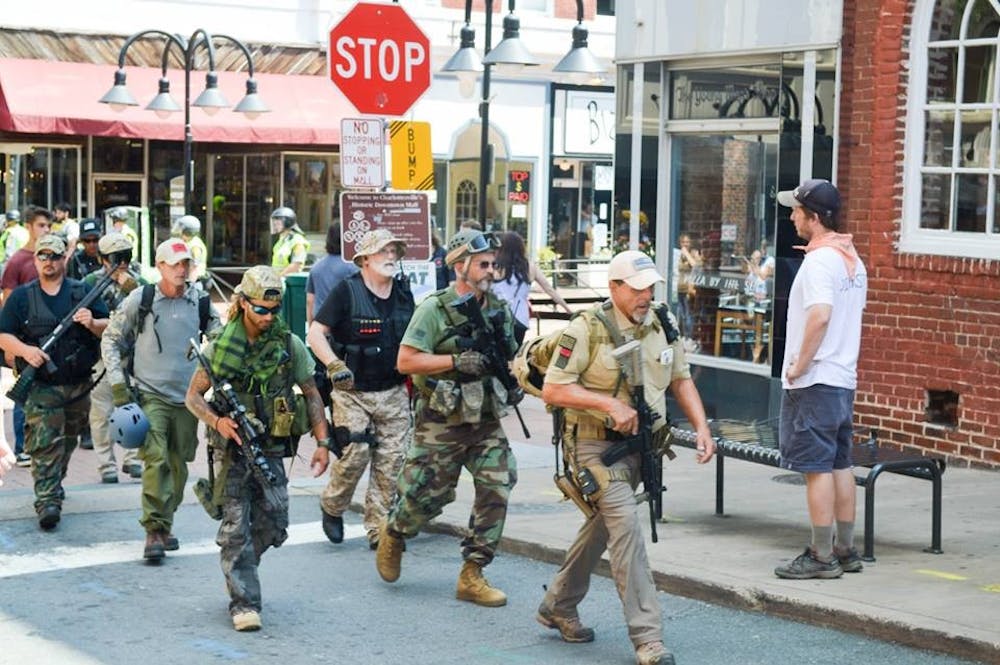A few weeks ago, I wrote a column in The Cavalier Daily explaining the reasoning behind my belief that the alt-right rally should go on. The way I see it, white supremacists, despite their irrefutably toxic ideology, are entitled to the same constitutional liberties as anyone else. I figured, maybe naïvely, that allowing them to assemble in public under the scrutiny of daylight would galvanize public opinion against their hateful beliefs and reveal the rotting foundation on which their ideology rests. It’s safe to say that the words and actions of the agitators in town over the weekend have proven how foolish I was. That’s not to say I no longer stand by my belief in the sanctity of the first amendment. I still maintain unconditional support for the right of any individual or group to express themselves, regardless of the message. My concern stems from the fact that the series of demonstrations which unravelled in Charlottesville no longer, and perhaps never did, qualify as protected speech.
Late Friday night we witnessed armed white supremacists marching through Grounds with lit torches, threatening, harassing and physically assaulting students who were organizing peacefully, or trying to go about their business as usual despite the shocking display unfolding in their backyard. On Saturday, the violence only worsened as the white supremacists lashed out against counter-protesters. Three people died, and dozens more were injured as a result of their barbarism. The members of the protest were abundantly clear with their intentions to incite violence in Charlottesville. Their calls for intimidation and agitation are well documented. What I failed to realize before today is that these threats were not overblown rhetoric. The way the ralliers conducted themselves over the weekend is disgusting and inexcusable.
I defended the rights of these white supremacists to assemble based on a belief of open access to the marketplace of ideas, where open discourse allows society to sort through ideologies without the outsize interference of institutions or governments. What I now realize is that the alt-right has no interest in participating in open discourse. Their weekend of demonstrations, and their entire movement, is based on overt and unapologetic intimidation, harassment and threats of violence. I defended the right of the alt-right to peacefully assemble, but they never intended for their assembly to be peaceful. They organized, applied for a permit and came to town with the full intention of inciting violence and agitating both the community and the national media.
The alt-right is a domestic terrorist organization. Their use of intimidation, terror and violence in the pursuit of their goals more than justify this categorization. They have no interest in engaging in reasoned, mature discourse within the bounds of civil society, and would rather rely on brute force and terrorism to achieve their goals. When the alt-right enters the open marketplace of ideas, they necessarily lose. It is precisely because of this fact that they rely on tactics such as intimidation and terror. Just as I would hesitate to approve of an assembly permit for any other terrorist organization that made consistent, credible threats of violence, I have serious reservations about the claims that this assembly of white supremacists has to protections under the first amendment.
What is unsettling about recent events is the fact that the protest permit has proven to be mostly irrelevant in the first place. The unsanctioned mass display of intimidation that occurred on Friday is proof enough. I was right to say in my earlier column that “the hateful rhetoric of the alt-right will not simply disappear if the government makes it harder for the ideas to be shared openly.” When the Charlottesville City Council ordered the rally be moved to McIntire park due to concerns of overcrowding, organizers affirmed their intention to disregard the decision and hold the rally in Emancipation park anyway. Refusing to issue permits to the alt-right doesn’t solve any problems, if anything it only creates more. Clearly, these white supremacists will organize either way, and I fear for what could happen if there are more unsanctioned protests without a police presence such as the one on Friday night.
I don’t pretend to have the answers for how to properly address the blight which has fallen on Charlottesville, and society as a whole. It is not right to grant assembly permits to groups that openly advertise their intent to commit acts of violence and harassment, but it’s no better to allow them to freely and lawlessly pursue their agenda of terror. I still believe true progress and healing can be achieved only through open, honest dialogue, but I’m unsure if it’s reasonable to expect the alt-right to come to the table without a fundamental cultural change.
I was wrong about the nature of the alt-right, but I am encouraged by the widespread backlash and denunciation of their ideology. Despite the shocking, gut wrenching images coming out of my town, the solidarity on display gives me hope that we can work towards a more open and inclusive society.
Parts of this column were adapted from and previously ran in The New York Times article “What U.Va. Students Saw in Charlottesville”
Brendan Novak is an Opinion editor for The Cavalier Daily. He can be reached at b.novak@cavalierdaily.com.







